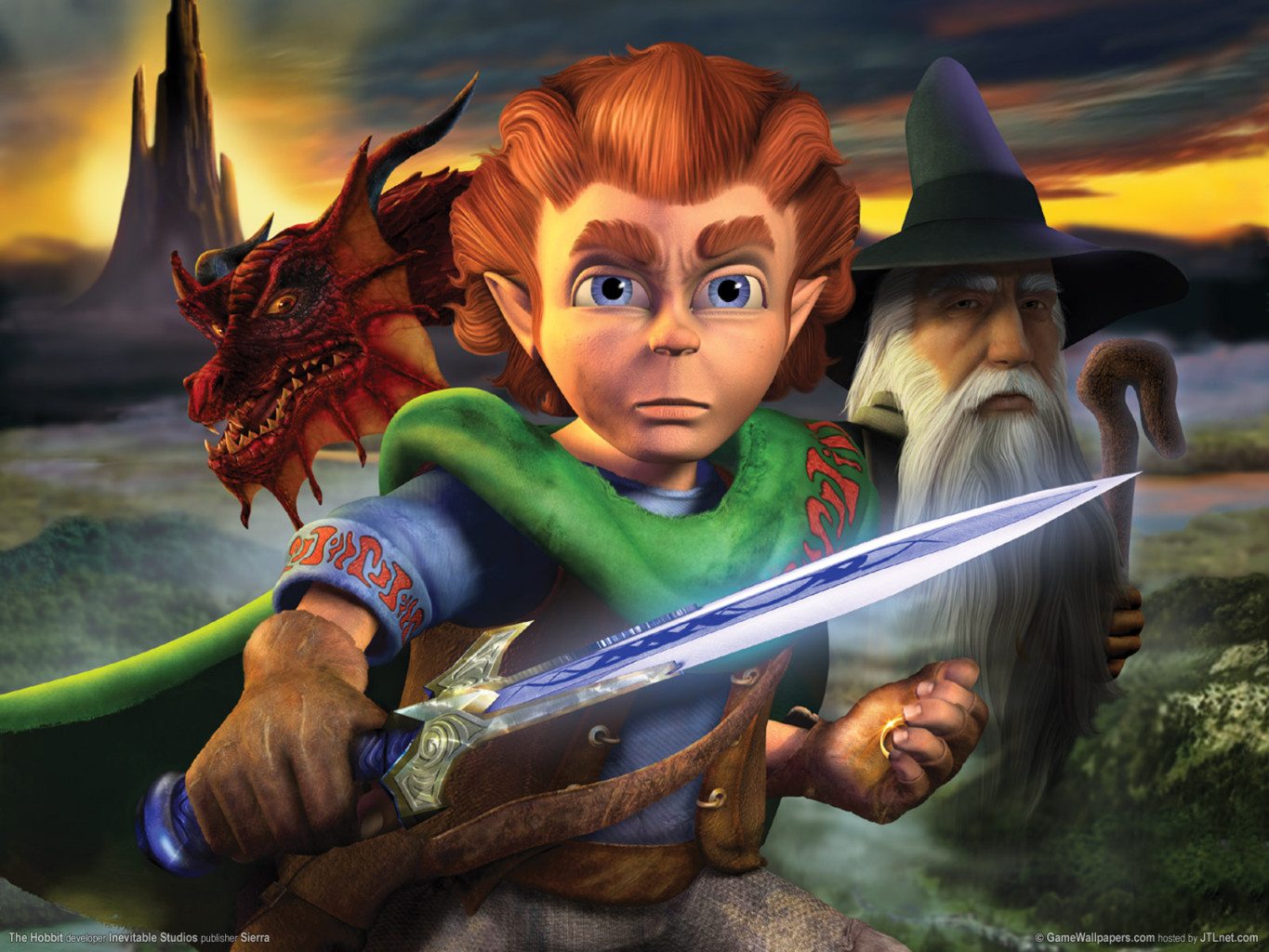The Virtual Reality of your Degree
Five of our writers discuss which games they think are best suited to their course of study.
English Literature: The Hobbit
 You could say that playing The Hobbit on PS2 back in 2003 inspired me to delve into the work of J.R.R.Tolkien, excited by the strong characters and its richly dense game world. In reality, that would be stretching the truth. I mean, I read The Hobbit after playing it, but only because it was so shit I needed to find something better to do with my time. The gameplay was like a low budget Zelda knock-off, Bilbo Baggins looked suspiciously like a cherubic version of Mick Hucknall, and it was more difficult than reading through all of the dodgy songs in the main LOTR books. Still, I guess it relayed the actual story of Bilbo finding the One Ring with more charm than Peter Jackson’s three film bloat-fest with the cast of BBC’s Sherlock. And, being a game based directly on a work of literature, it is fairly unique. But, yeah, still shit. Personally, I’m still waiting for Rockstar to make their own version of The Great Gatsby , complete with lavish parties with a GTA-esque “make it rain” option, and a quick-time event cut-scene where you get to mow down Myrtle in a vintage sports car. Luke Brown [divider]
You could say that playing The Hobbit on PS2 back in 2003 inspired me to delve into the work of J.R.R.Tolkien, excited by the strong characters and its richly dense game world. In reality, that would be stretching the truth. I mean, I read The Hobbit after playing it, but only because it was so shit I needed to find something better to do with my time. The gameplay was like a low budget Zelda knock-off, Bilbo Baggins looked suspiciously like a cherubic version of Mick Hucknall, and it was more difficult than reading through all of the dodgy songs in the main LOTR books. Still, I guess it relayed the actual story of Bilbo finding the One Ring with more charm than Peter Jackson’s three film bloat-fest with the cast of BBC’s Sherlock. And, being a game based directly on a work of literature, it is fairly unique. But, yeah, still shit. Personally, I’m still waiting for Rockstar to make their own version of The Great Gatsby , complete with lavish parties with a GTA-esque “make it rain” option, and a quick-time event cut-scene where you get to mow down Myrtle in a vintage sports car. Luke Brown [divider]
Maths: Portal
 Generally speaking people do not associate mathematics with fun, they associate it with bad teachers and the phrase “When will we ever need to use this?” However you use maths more than you realise in Portal . The aim of the game is to use your ‘Portal Gun’ – a gun which creates two portal openings through which you can pass – to solve puzzles and complete levels. Quickly, puzzles become more challenging and without realising it you start using your instinctive mathematics skills to complete them, whether you’re creating an infinite loop to accelerate before moving your portal to shoot out the other side, finding the correct height to place your portal so that you fall out at the right trajectory, or maybe just placing two portals on the floor and watching as you oscillate between the places (simple harmonic motion). In the poignant words of Jesse Pinkman, “Yeah! Science, Bitch”. Stephen Smith [divider]
Generally speaking people do not associate mathematics with fun, they associate it with bad teachers and the phrase “When will we ever need to use this?” However you use maths more than you realise in Portal . The aim of the game is to use your ‘Portal Gun’ – a gun which creates two portal openings through which you can pass – to solve puzzles and complete levels. Quickly, puzzles become more challenging and without realising it you start using your instinctive mathematics skills to complete them, whether you’re creating an infinite loop to accelerate before moving your portal to shoot out the other side, finding the correct height to place your portal so that you fall out at the right trajectory, or maybe just placing two portals on the floor and watching as you oscillate between the places (simple harmonic motion). In the poignant words of Jesse Pinkman, “Yeah! Science, Bitch”. Stephen Smith [divider]
Classics: Civilization
The Civilization series of strategy games sees you assuming the role of leader for a society and taking it from a tribal village to a world-dominating superpower, balancing resources and international relations to try and get ahead or to just survive. On a cursory level Civilization can give you a surprisingly good overview of the history of technology, warfare, politics and well, civilisation. However on a more fundamental level it provides a unique understanding of how states cooperate with one another, making something that sounds dry and boring more interactive and entertaining.
The series is great for anyone with an interest in history or politics but particularly appeals to me as a classicist because of how often the game takes an eerie resemblance to actual ancient history. They may not be for everyone (and also run the risk of eating all of the time that you should probably spend working or sleeping) but any of the Civilization games are well worth checking out if you fancy something a little more cerebral than just shooting men with guns until they fall down. Charlie Roberson [divider]
Philosophy: Bioshock
Truth be told, it’s not easy to pinpoint one particular game to suit Philosophy, a study that could be related to almost anything if you blag hard enough (and trust me, Philosophy students know a thing or two about blagging). Having said that, there are certain games that will entice philosophers more than others, whether their developers intended them to or not. Fallout 3 had a morality system that forced the player to make ethical decisions. Deus Ex asked a compelling question; would you add robotic limbs to your body if they made you stronger or more agile? However, the standout for me would be the original Bioshock, whose philosophical theme of objectivism (i.e. the idea that self-interest is a moral virtue) is the driving force behind the tragic story of Rapture and its spliced up denizens. No wonder Bioshock antagonist Andrew Ryan has an eerily similar name to Ayn Rand, a twentieth century philosopher who gave an account of objectivism in her book Atlas Shrugged. It’s a nice tip of the hat, and I’ll eat mine if it’s not deliberate. Joe Baker [divider]
Physics: Antichamber
Upon its release, Antichamber was promptly and deservedly buried under a mountain of Indie game awards, including ones from the likes of PAX and IGF. The official website describes Antichamber as a “mind-bending psychological exploration game”. While it is true that this game is psychological – in the sense that it requires the player to reassess their preconceptions and thought processes involved in puzzle games (an intriguing prospect itself) – the game’s one and only developer stated that the game was conceived as a geometry based puzzle game, the psychological implications of the game only being realised later. For me, this explains why the psychological themes seem rather undeveloped and ad hoc. Developed with a unique, minimalist and striking visual style, this stellar indie game throws at you fiendish puzzles, non-euclidian geometry and environments which literally change depending on how you look at them. At least a handful of WTF moments are guaranteed. As a subject which relies heavily on problem-solving, analysing the physical world and dealing with brain melters like QM and Relativity, if you like physics you’ll love Antichamber. Lewis Ball
[divider_top]
![]() What game suits your degree best? Tweet @BoarGames
What game suits your degree best? Tweet @BoarGames



Comments